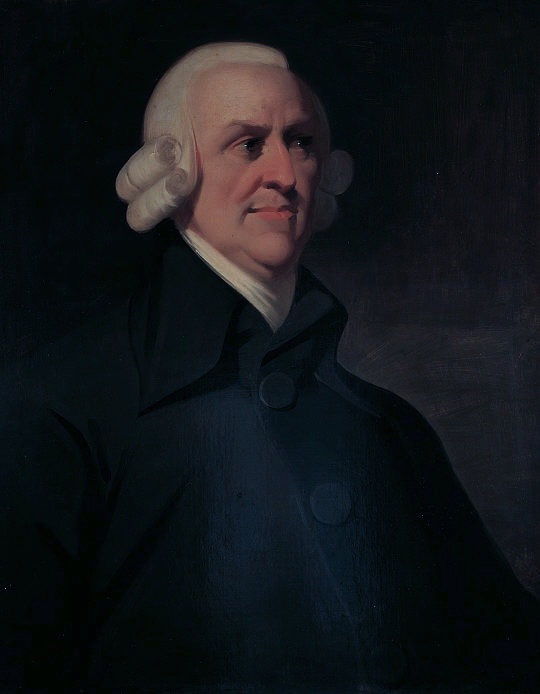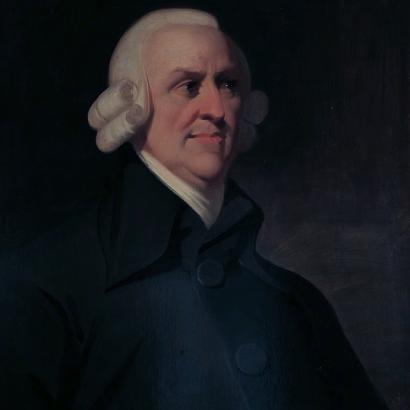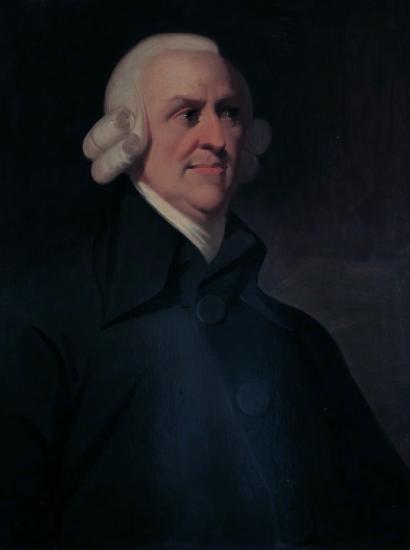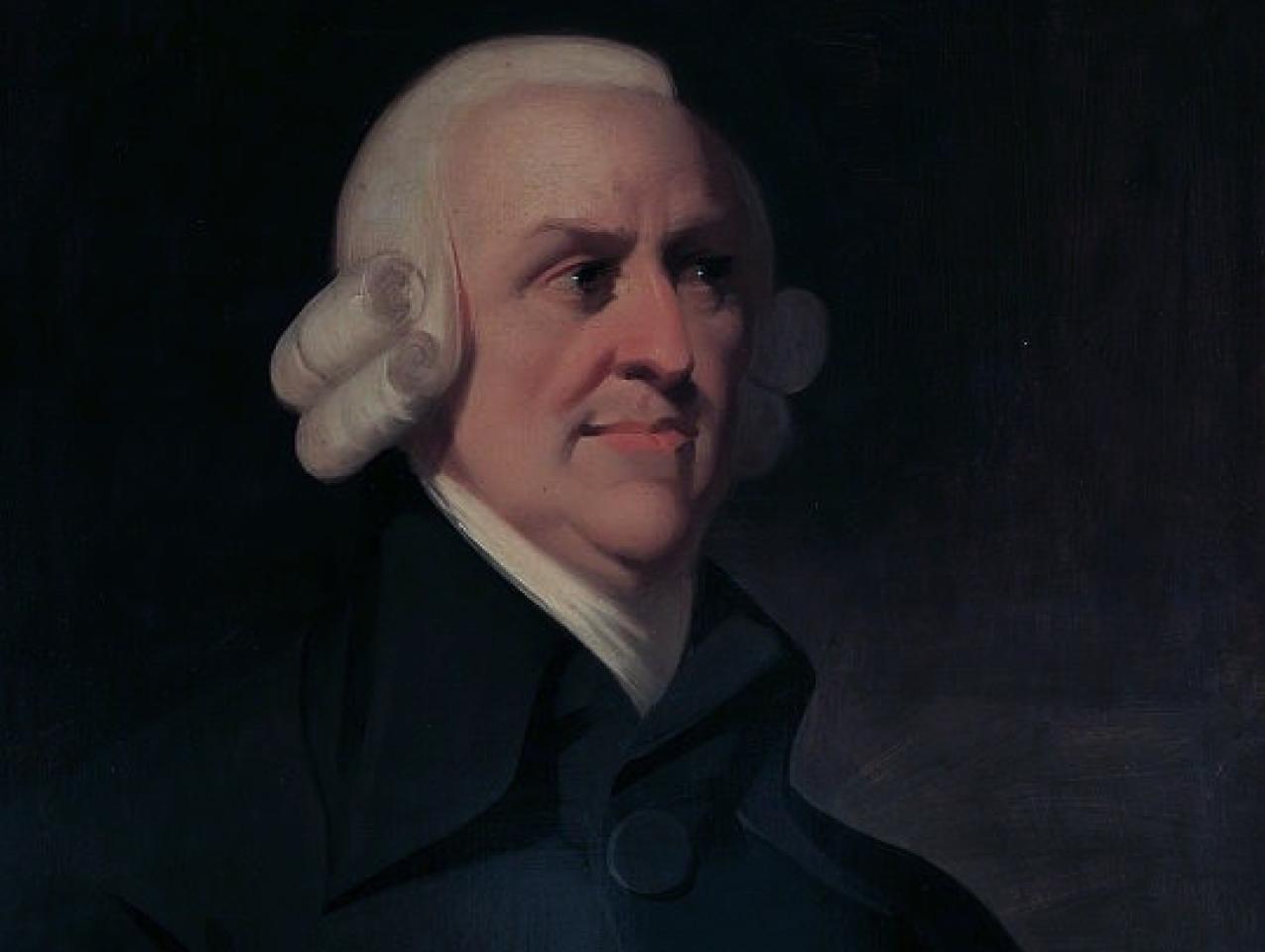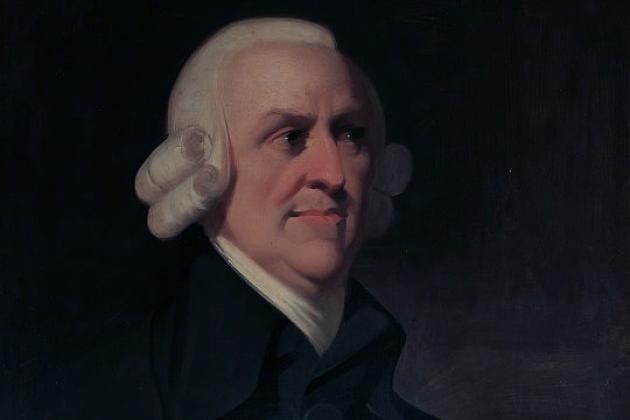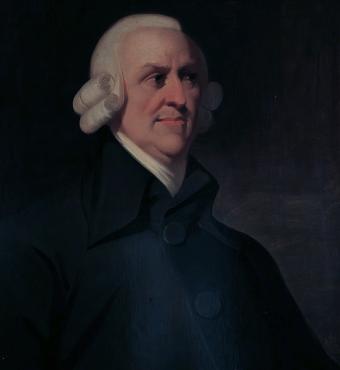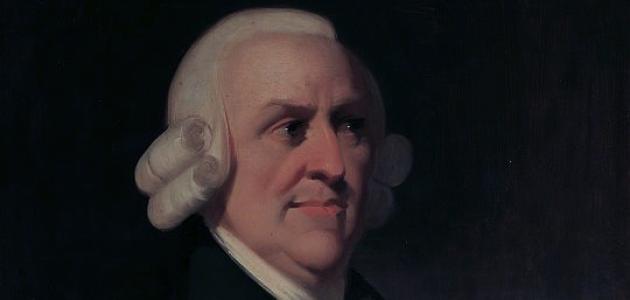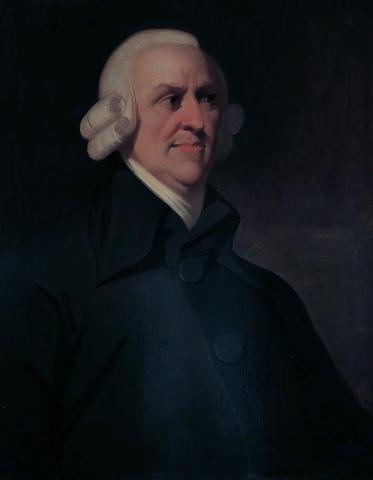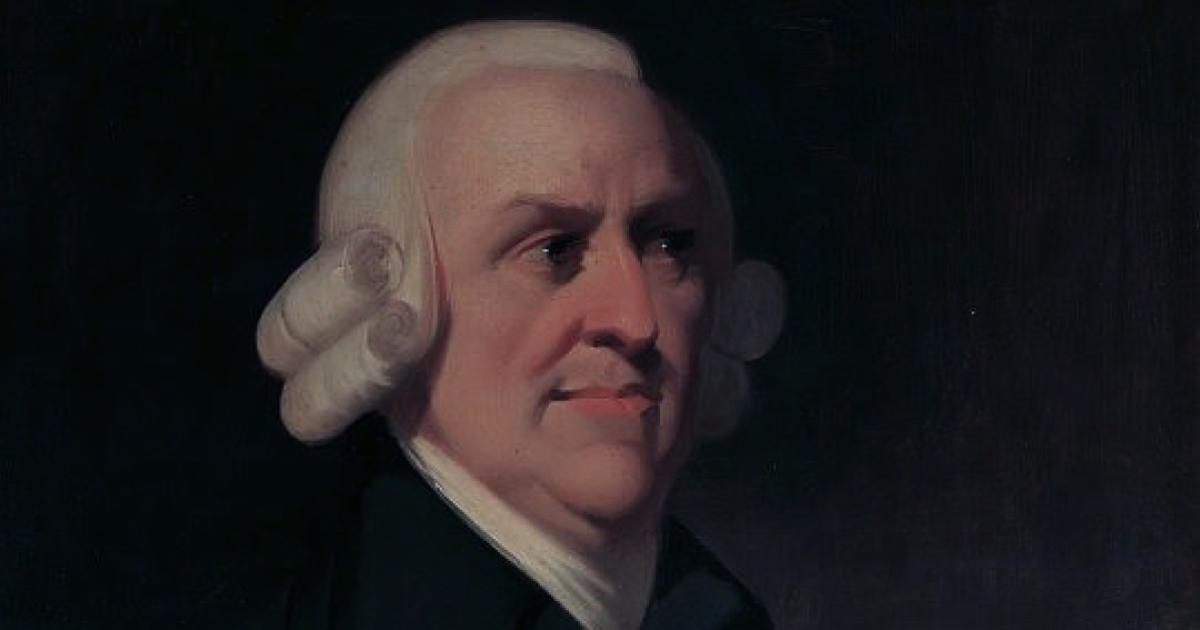I don’t want to let 2023 pass without paying tribute to arguably the most important birthday three hundred years ago: that of economist and moral philosopher Adam Smith. Smith wrote two important books: his lesser-known The Theory of Moral Sentiments (TMS) published in 1759 and his well-known An Inquiry into the Nature and Causes of the Wealth of Nations, published in 1776.
Both were important but The Wealth of Nations (WN) was much more important. While it is an exaggeration to say that Smith was the first economist, it is no exaggeration to say that he was the most important up to his time. His belief in the labor theory of value, which so misled Karl Marx, was shown, in the marginal revolution of 1870, to be wrong. But a list of his insights that still stand is extensive. Page through WN and you will find many important thoughts: on the division of labor, what’s wrong with mercantilism and protectionism, the folly of industrial policy, and many more.
Division of labor
Although the 1,000-plus pages can bog down in places, WN starts with a bang. Here’s the first sentence:
The greatest improvement in the productive powers of labour, and the greater part of skill, dexterity and judgement with which it is anywhere directed, or applied, seem to have been the effects of the division of labour.
In other words, economic output (“the productive powers of labour”) grows with the division of labor.
Smith illustrated this point with his famous empirical study of a pin factory. He speculated that one person producing pins could produce between one and twenty pins daily. But, he found by actually examining a pin factory, that production of pins required eighteen separate steps and that each of ten laborers specialized in one or two of those steps. The result? Ten laborers could produce about 48,000 pins a day.
What was the main effect of this extensive division of labor? According to Smith, it was “that universal opulence which extends itself to the lowest ranks of the people.” In short, even the common man is better off in an economy with an intricate division of labor.
Smith went further, writing:
[I]t may be true, perhaps, that the accommodation of an European prince does not always so much exceed that of an industrious and frugal peasant, as the accommodation of the latter exceeds that of many an African king, the master of the lives and liberties of ten thousand naked savages.
In short, in Smith’s view, the extensive division of labor in Britain caused even industrious peasants to live substantially better than many African kings.
The basis of division of labor
What gives rise to the division of labor? Smith argued that it comes about because of our “propensity to truck, barter, and exchange one thing for another.”
Smith noted that whereas animals don’t trade with each other, humans do. That’s fortunate because man “stands at all times in need of the cooperation and assistance of great multitudes, while his whole life is scarce sufficient to gain the friendship of a few persons.” We have “almost constant occasion for the help of” our brethren. For that reason, we can’t depend just on favors. Thus does Smith get to the famous thought in WN, writing:
It is not from the benevolence of the butcher, the brewer, or the baker that we expect our dinner, but from their regard to their own self-interest. We address ourselves not to their humanity but to their self-love, and never talk to them of our own necessities, but of their advantages.
Does that mean that Smith thought self-interest was all that was needed for a society to work? No, as he made clear in his earlier TMS. More on that anon.
Mercantilism, protectionism, and free trade
One of Adam Smith’s major accomplishments was his systematic critique of mercantilism, along with his critique of protective tariffs and his defense of free trade.
Mercantilism, in brief, is the idea that the way for a nation to get rich is to limit its imports and increase its exports. The goal is to have exports exceed imports so that the country builds up its stock of specie (gold and silver).
Smith argued that wealth “does not consist in money, or in gold and silver; but in what money purchases, and is valuable only for purchasing.” Acquiring an unnecessary amount of gold and silver, he argued, “is as absurd as it would be to attempt to increase the good cheer of private families by obliging them to keep an unnecessary number of kitchen utensils.”
Because Smith was so aware that people in one nation trade with those in another only when they expect to gain, there was no particular reason for one nation to have a balance of trade with another. He wrote:
When two places trade with one another, this [balance of trade] doctrine supposes that, if the balance be even, neither of them either loses or gains; but if it leans in any degree to one side, that one of them loses and the other gains in proportion to its declension from the exact equilibrium.
But both sides gain whether or not there’s a balance.
Not surprisingly, therefore, Smith was a foe of protectionism. He argued that to give a “monopoly of the home market to the produce of domestic industry, in any particular art or manufacture, is in some measure to direct private people in what manner they ought to employ their capitals, and must, in almost all cases, be either a useless or a hurtful regulation. If the produce of domestic can be brought there as cheap as that of foreign industry, the regulation is evidently useless. If it cannot, it must generally be hurtful.” Just as he analogized nations gaining gold and silver to households gaining excess kitchen utensils, Smith wrote that it “is the maxim of every prudent master of a family never to make at home what it will cost him more to make than to buy.”
To drive the point home, Smith wrote:
What is prudence in the conduct of every private family can scarce be folly in that of a great kingdom. If a foreign country can supply us with a commodity cheaper than we ourselves can make it, better buy it of them with some part of the produce of our own industry employed in a way in which we have some advantage.
Incidentally, while economists, including me, have always said that we had to wait until James Mill and David Ricardo to get the economists’ theory of comparative advantage, one can see the seeds of that theory in the last sentence of the above quote.
We often hear people, even today, claim that we should produce goods here rather than buy them abroad. To that idea, Smith had a beautiful reductio ad absurdum. He wrote:
By means of glasses, hotbeds, and hot walls, very good grapes can be raised in Scotland, and very good wine too can be made of them at about thirty times the expense for which at least equally good can be brought from foreign countries.
Then he followed with a rhetorical question: “Would it be a reasonable law to prohibit the importation of all foreign wines merely to encourage the making of claret and burgundy in Scotland?” Smith’s point is that if we are willing to do things more expensively, it’s possible to produce everything at home. But why do that when we can buy cheaper abroad and deploy our labor and capital in more efficient ways? This applies whether producing at home is thirty times as expensive or only 20 percent more expensive.
Industrial policy
Although the term “industrial policy” was not used during Smith’s day, Smith nevertheless had a trenchant critique of industrial policy. He wrote:
What is the species of domestic industry which his capital can employ, and of which the produce is likely to be of the greatest value, every individual, it is evident, can, in his local situation, judge much better than any statesman or lawgiver can do for him. The statesman who should attempt to direct private people in what manner they ought to employ their capitals would not only load himself with a most unnecessary attention, but assume an authority which could safely be trusted, not only to no single person, but to no council or senate whatever, and which would nowhere be so dangerous as in the hands of a man who had folly and presumption enough to fancy himself fit to exercise it.
We can even see in this passage the seeds of Hayek’s insights into why socialism won’t work: the socialist planners don’t have, and can’t have, the information needed to plan an economy because this “local knowledge,” a term used by economists in the Hayek tradition, exists in the minds of the actual players.
Smith on antitrust
Many people, including economists, often recruit Smith to make their case for antitrust laws, using the following quote:
People of the same trade seldom meet together, even for merriment and diversion, but the conversation ends in a conspiracy against the public, or in some contrivance to raise prices.
This quote shows Smith’s hard-headed, unromantic view of businessmen and even, possibly, of laborers.
Rarely do those who thus argue for antitrust quote the next two sentences:
It is impossible indeed to prevent such meetings, by any law which either could be executed, or would be consistent with liberty and justice. But though the law cannot hinder people of the same trade from sometimes assembling together, it ought to do nothing to facilitate such assemblies; much less to render them necessary. (italics added)
Smith even went on to point out that one way government facilitated such assemblies was by requiring people in a particular trade to enter names and addresses in a government registry. Today, of course, government regulation has gone way beyond what Smith observed. People in various businesses have conventions at which they discuss how to deal with and possibly influence government regulation. While there, they might collude. Smith would probably not be happy that extensive government regulation has facilitated that.
Smith’s predictions about the thirteen colonies
In The Wealth of Nations, Smith argued that Britain’s expense of defending the thirteen colonies was a losing proposition. He also predicted that Britain would not voluntarily give up the colonies, writing, “No nation ever voluntarily gave up the dominion of any province.” He made two other predictions. One was that the thirteen colonies would prevail. The other was this: “From shopkeepers, tradesmen, and attornies, they are become statesmen and legislators, and are employed in contriving a new form of government for an extensive empire, which, they flatter themselves, will become, and which, indeed, seems very likely to become, one of the greatest and most formidable that ever was in the world.” (italics added) Not bad for a guy sitting at his desk and writing in 1775.
The Theory of Moral Sentiments
Unfortunately, my word constraint prevents me from considering Smith’s lesser-known Theory of Moral Sentiments as much as I would like.
I do want to hit a few highlights, though. Whereas WN is about what conditions are required for wealth to grow, TMS is more about what is required for one to have a good life. My favorite quote from TMS is this: “Man naturally desires, not only to be loved, but to be lovely.” Smith observed that something within us makes us want not only to be loved but also to be deserving of love. There is no contradiction between this idea and the idea in WN that we do things for strangers out of self-interest. The two books, together, indeed, are a nice package and I’m glad that in 2023 I finally got around to reading the whole of TMS.
Slavery
While there are so many possible parts of TMS to focus on, I’ll mention one because of its importance: Smith’s principled objection to slavery. He never came out and said that slavery is wrong, but the language he used leaves no doubt. Here’s what he wrote about slavery of Africans:
There is not a negro from the coast of Africa who does not, in this respect, possess a degree of magnanimity which the soul of his sordid master is too often scarce capable of conceiving. Fortune never exerted more cruelly her empire over mankind, than when she subjected those nations of heroes to the refuse of the jails of Europe, to wretches who possess the virtues neither of the countries which they come from, nor of those which they go to, and whose levity, brutality, and baseness, so justly expose them to the contempt of the vanquished.
Adam Smith provided so much to mankind. It is fitting that we remember him and even still read him. Happy birthday, Mr. Smith.







